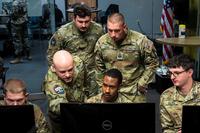Fears that the Space Force's new fitness program will lead to micromanagement and punishment for not working out enough, as well as create a risk that personal data will be used against Guardians, are circling the service's developing plans to use wearable health trackers.
The Holistic Health Assessment, the Space Force's answer to the military's yearly physical fitness tests, has been pitched by the service as a revolutionary way for Guardians to stay in shape year-round. The Space Force hopes troops will routinely wear fitness trackers similar to Apple Watches or Fitbits by 2023 to keep them focused on their health all the time, instead of getting out of shape and then dreading a punitive -- or possibly career-ending -- evaluation.
But as the Space Force's fitness leaders visit bases to pitch the program during what they're calling "road shows" to share their ideas for the assessment, some Guardians have complained that the envisioned futuristic health plan may be turning out differently than originally pitched.
Read Next: Airman Accused of Insider Attack on US Base in Syria That Injured 4 Troops
During a "road show" at a base in Colorado, the program was described as having some punitive consequences for Guardians who don't meet certain thresholds, despite early suggestions that the service wouldn't penalize service members based on the data they collect through the wearable devices.
While Space Force's command declined to discuss specifics of the program in response to a query from Military.com, citing ongoing development, a recording of a presentation with a question-and-answer session about the Holistic Health Assessment was posted to the YouTube account of Space Force's Peterson-Schriever Garrison. The undated video was unlisted, meaning it doesn't show up in searches and doesn't show up on the Garrison's YouTube page, but was discovered by Military.com.
"There's a lot of socialization about this being a non-punitive program and taking all the punishment away from fitness and there's a little bit of truth to that, but there's still going to be an accountability piece," Carl Sheppard, a strength and conditioning specialist working to develop the program with the Space Force, said during the presentation.
The plans pitched during the road show to keep Guardians on track for the new fitness program included monitoring service members' devices to make sure they're getting around 300 minutes a week in purposeful physical activity, keeping tabs on their muscle oxygen consumption levels and watching their height-to-waist ratio to make sure they're maintaining a healthy physique.
A "Guardian Resilience Team," a group of service members at each base who specialize in fitness and training, would oversee the data brought in by the wearable fitness devices to track who is falling behind.
The Guardians' data will be analyzed and classified under a color code -- red if they're failing, amber if they're average and green if they're on track and surpassing expectations, officials said during the presentation.
When the program was pitched initially, Chief Master Sergeant of the Space Force Roger Towberman told Military.com back in March he wanted to get away from "disciplinary, punitive interventions" because of a failed annual test.
But it became clear during the "road show" that Guardians who are lagging behind could be punished.
One official who presented during the road show -- and did not identify themselves on the presentation recording -- said she understands that some people's fitness may fall by the wayside with different life situations but noted, "If somebody is red for a quarter, that's when the command is going to get involved."
One Guardian, who spoke to Military.com on condition of anonymity because they're not authorized to speak to the media without approval, said there's some concern that the program could become punitive and lead to similar problems the Air Force saw -- like people evidencing disordered eating to make the standards.
"I think it's OK so long [as] it's not punitive [and] as long as you're taking care of yourself," the Guardian said. "It's going to be interesting in how it's implemented."
While there isn't an annual test to be stressed over, some Guardians have grumbled on the Space Force subreddit that having to monitor a multitude of fitness factors every week sounds exhausting, even daunting -- and not exactly the no-test setup they were promised.
More than 200 Guardians responded to a sarcastic multiple-choice poll posted on the subreddit that asked, "What do you think about the PT changes?"
More than half of the respondents chose, "The new test scheme sounds amazing (I love micromanagement!!!)" or "Just let me test once 'or twice' a year (be an adult.)"
The others responded, "Wait ... the Space Force does PT???" or "I am getting out, I don't care!"
"We are outlining the parameters to study, test and evaluate various measurables, to include healthy sleep habits, diet, regular exercise and aerobic capacity," Maj. James Fisher, a Space Force spokesman, said in an emailed statement. "Depending on the findings from our test phase, we hope to move away from episodic physical fitness training and test with a new program that is focused on holistic health."
Reliance on personal fitness trackers has raised concerns among military security experts, especially after past incidents in which such data shared on social media revealed the locations of military bases and patrol routes.
It's not clear what devices the Space Force will ultimately settle on, but the service plans to offer a wide variety of choices for Guardians to select from.
Some Guardians raised concerns about how the Space Force and the Department of Defense could use and analyze their data in the future.
One Guardian, whose name could not be heard on the "road show" video, said during a question-and-answer portion of the program that he didn't want his health data to be used against him when he is hoping to get certain care from a Veterans Affairs hospital in the future.
"They're going to have two decades, potentially, of health care data on me by the time I retire," another Guardian said during the question-and-answer session. "Any problems that you happen to accumulate over two decades of experience is because there's also two decades of data to say 'you didn't run enough' or 'he didn't work out enough' and that you could potentially limit someone's access to health care in retirement. I think that's one reason that I would potentially opt out."
Space Force officials have said they don't plan to track GPS data, and that it wouldn't be shared with other agencies. Sheppard, the strength and condition coach who helped with the presentation, said the service wouldn't keep their information for long.
"The Space Force will own that data, and we're looking at how long we're going to keep it," Sheppard told Guardians during the road show. "A year, two years, and then we'll ... cryptographically erase the data."
Little information has been publicly broadcast by the Space Force about the wearables program since it was first announced in March.
"The purpose of the road show is NOT to provide information," Towberman wrote on the Space Force subreddit last month. "The purpose is to decrease anxiety and improve confidence across the force WITH information. If the roadshow doesn't scratch [that] itch, we will have failed."
The Space Force's plans to develop a revolutionary fitness program come amid a recent shift by many of the services to break away from a single test, in which the score can often mean the difference between career advancement and being booted from the force.
Until the program is finalized next year, Guardians have been told to rely on the Air Force's decades-old PT test, which includes sit-ups, push-ups and a 1.5-mile run.
Other proposed parts of the Space Force's Holistic Health Assessment that have not been widely discussed would encourage regular sleep patterns, promote a balanced diet and decrease alcohol consumption, as well as set time for meaningful meditation and reflection.
"This program will promote not just physical fitness; it will pair fitness with robust education on diet, sleep, hygiene and other physiological factors to promote social, mental and spiritual health as well," said Fisher, the Space Force spokesman.
-- Thomas Novelly can be reached at thomas.novelly@military.com. Follow him on Twitter @TomNovelly.
Related: Space Force's Physical Training Will Include Wearable Fitness Trackers













